ARCHITECTURE
The Taj Mahal
The Taj Mahal at Agra,
one of the 7 wonders of the world is undoubtedly the finest achievement
and the most exquisite of all Moghul buildings. In its flawless beauty
it ranks among the most perfect monuments in the world. It was erected
by Shah Jahan to the memory of his beloved queen, Arjumand Banu Begum,
called Mumtaz Mahal ( exalted of the palace ). A year after her death in
1631 he began the Taj and it took twenty-two years to complete.
The Taj Mahal stands in a walled
enclosure measuring around 580x305m. The red sandstone gateway at the south
leads to a spacious ornamental garden(305sq m). Near the river Jamuna on
the northern side of the enclosure, a low red stone terrace extends from
one end of the wall to the other, terminating on both sides in a red standstone
building. That on the west is a mosque, and the eastern one-its jawab
(answer) - serves as mihman-khana (guest house) or as majlis khana (assembly
hall).
In the centre, on a white marble
platform almost seven metres high, is the rauza in glittering white marble,
with four minarests at the corners of the plinth. The bevelled angles give
this cubicle structure the shape of an irregular octagon. The elevation,
equal on all four sides, is typically Islamic in design.
The greatest elegance of the Taj
lies in its beautiful white marble dome surrounded by four chatris (smaller
domed pavilions). The dome rests on a low drum. Lotus petals encircle its
restricted base. It curves up gently to the pointed top, covered with radiating
petals. While the dome reveals Persian influence, the four chatris are
purely Indian.
Delicacy and grace characterise
the beauty of the Taj. The white marble from the Makrana quarries has a
texture of the finest quality. It shows subtle variations in colour with
every change of light; dazzling white in the noonday sunshine, tinted pale
rose at sunset, and gleaming like a pearl in the moonlight.
Light and shade are
cleverly arranged. There are no outstanding parts producing sharp contrasts
of light and shadow; the shadows are soft and delicate. The arched
recess of doors and windows are just deep enough to bring out their pointed
shape. This softness of shadows is oneof the great charms of the Taj.
The lovely tomb building together
with the four minarets, detatched from it yet united by means of the common
platform, form a harmonious open design. The setting too fits such a lovely
masterpiece. A pair of buildings in red sandstone flank the glittering
white edifice. Before it lies a spacious garden laid out in a conventional
plan, forming a carpet of green lawns and flower beds as well as of strems,
fountains and lotus pools whose clear waters mirror the beauty of the
Taj. The contrast of the dark green trees and red sandstone buildings
enhances its white loveliness all the more.
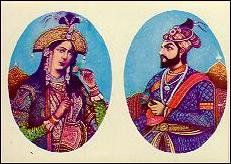
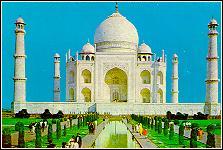
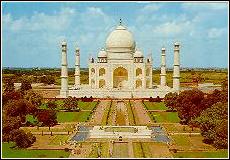
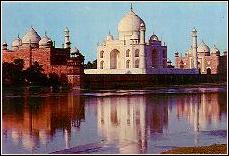
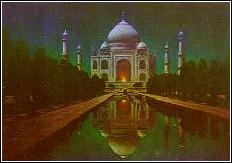
|